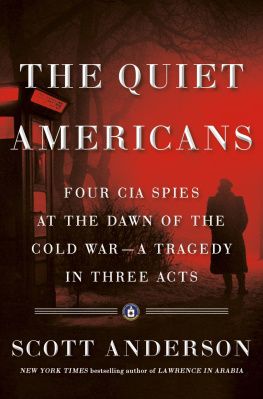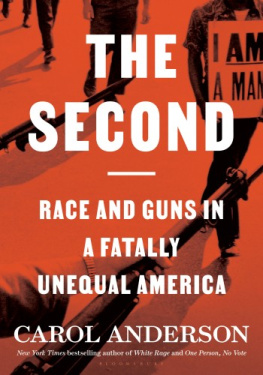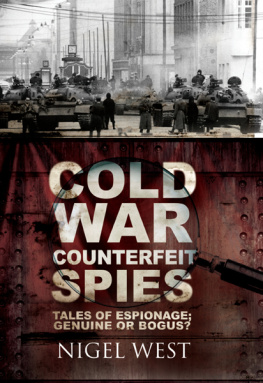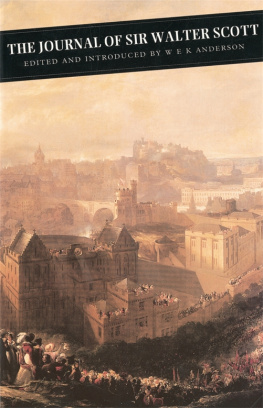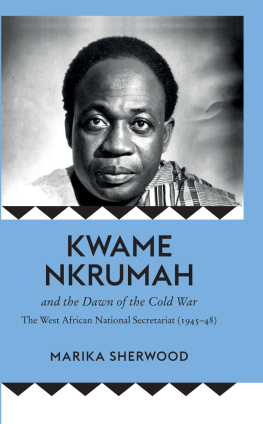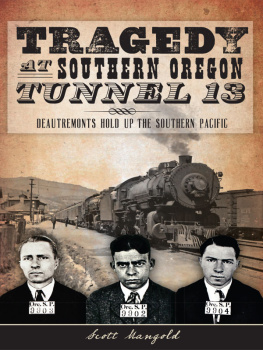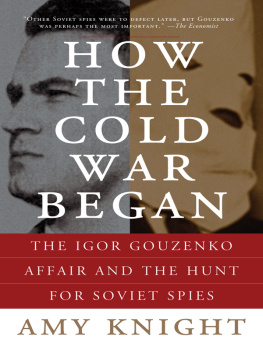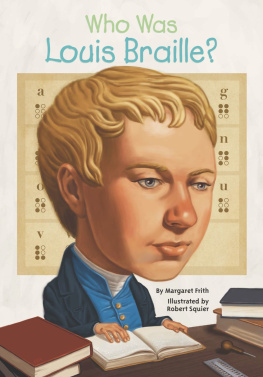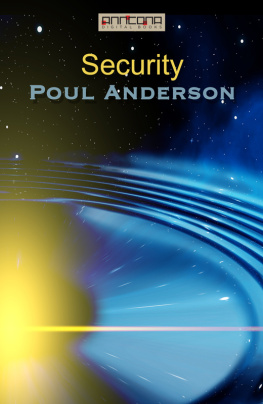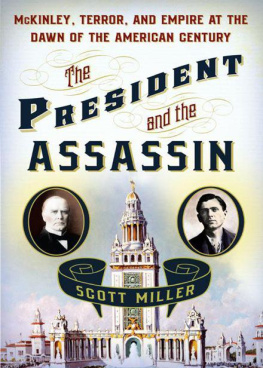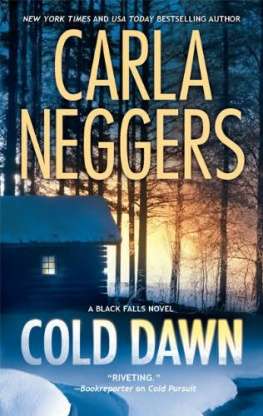Scott Anderson - The Quiet Americans: Four CIA Spies at the Dawn of the Cold War--a Tragedy in Three Acts
Here you can read online Scott Anderson - The Quiet Americans: Four CIA Spies at the Dawn of the Cold War--a Tragedy in Three Acts full text of the book (entire story) in english for free. Download pdf and epub, get meaning, cover and reviews about this ebook. year: 2020, publisher: Knopf Doubleday Publishing Group, genre: History. Description of the work, (preface) as well as reviews are available. Best literature library LitArk.com created for fans of good reading and offers a wide selection of genres:
Romance novel
Science fiction
Adventure
Detective
Science
History
Home and family
Prose
Art
Politics
Computer
Non-fiction
Religion
Business
Children
Humor
Choose a favorite category and find really read worthwhile books. Enjoy immersion in the world of imagination, feel the emotions of the characters or learn something new for yourself, make an fascinating discovery.
- Book:The Quiet Americans: Four CIA Spies at the Dawn of the Cold War--a Tragedy in Three Acts
- Author:
- Publisher:Knopf Doubleday Publishing Group
- Genre:
- Year:2020
- Rating:3 / 5
- Favourites:Add to favourites
- Your mark:
- 60
- 1
- 2
- 3
- 4
- 5
The Quiet Americans: Four CIA Spies at the Dawn of the Cold War--a Tragedy in Three Acts: summary, description and annotation
We offer to read an annotation, description, summary or preface (depends on what the author of the book "The Quiet Americans: Four CIA Spies at the Dawn of the Cold War--a Tragedy in Three Acts" wrote himself). If you haven't found the necessary information about the book — write in the comments, we will try to find it.
Scott Anderson: author's other books
Who wrote The Quiet Americans: Four CIA Spies at the Dawn of the Cold War--a Tragedy in Three Acts? Find out the surname, the name of the author of the book and a list of all author's works by series.
The Quiet Americans: Four CIA Spies at the Dawn of the Cold War--a Tragedy in Three Acts — read online for free the complete book (whole text) full work
Below is the text of the book, divided by pages. System saving the place of the last page read, allows you to conveniently read the book "The Quiet Americans: Four CIA Spies at the Dawn of the Cold War--a Tragedy in Three Acts" online for free, without having to search again every time where you left off. Put a bookmark, and you can go to the page where you finished reading at any time.
Font size:
Interval:
Bookmark:
The 4 OClock Murders
The Man Who Tried to Save the World
Fractured Lands
Lawrence in Arabia
Inside the League
War Zones
Triage
Moonlight Hotel
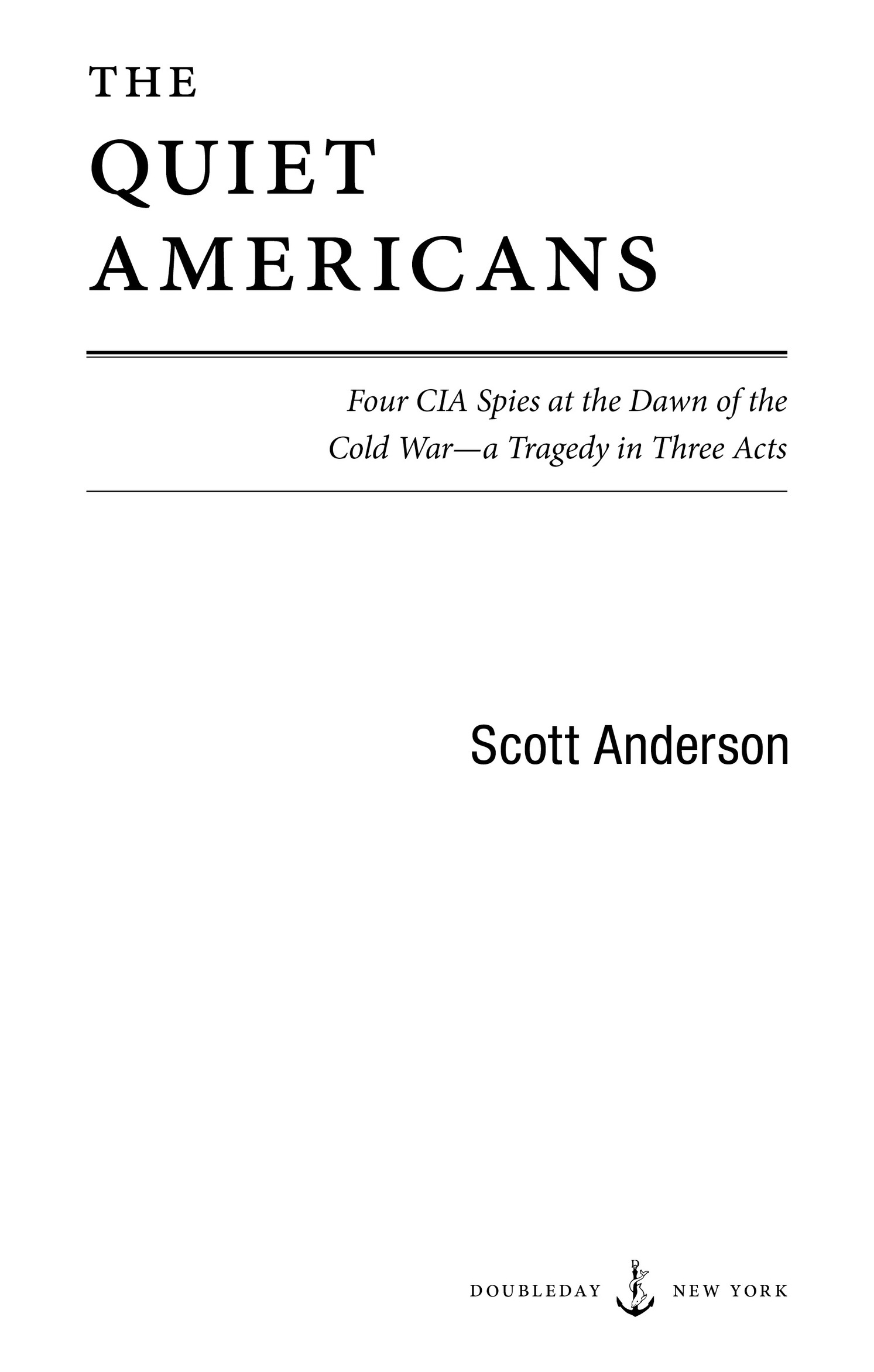
Copyright 2020 by Scott Anderson
All rights reserved. Published in the United States by Doubleday, a division of Penguin Random House LLC, New York.
www.doubleday.com
DOUBLEDAY and the portrayal of an anchor with a dolphin are registered trademarks of Penguin Random House LLC.
Cover photograph: ullstein bild / Getty Images; (seal) Peter Probst / Alamy
Cover design by John Fontana
Library of Congress Cataloging-in-Publication Data
Names: Anderson, Scott, 1959 author.
Title: The quiet Americans : four CIA spies at the dawn of the Cold Wara tragedy in three acts / Scott Anderson.
Other titles: Four CIA spies at the dawn of the Cold Wara tragedy in three acts
Description: First edition. | New York City : Doubleday, [2020] | Includes bibliographical references. |
Identifiers: LCCN 2019054799 (print) | LCCN 2019054800 (ebook) | ISBN 9780385540452 (hardcover) ISBN 9780385540469 (ebook)
Subjects: LCSH : United States. Central Intelligence AgencyOfficials and employeesBiography. | Cold War. | Espionage, AmericanHistory20th century. | Burke, Michael, 1918 | Wisner, Frank, 19091965. | Sichel, Peter M. F. | Lansdale, Edward Geary, 19081987. | Intelligence officersUnited StatesBiography. | SpiesUnited StatesBiography.
Classification: LCC JK 468. I 6 A 8435 2020 (print) | LCC JK 468. I 6 (ebook) | DDC 327.12730092/2dc23
LC record available at https://lccn.loc.gov/2019054799
LC ebook record available at https://lccn.loc.gov/2019054800
Ebook ISBN9780385540469
ep_prh_5.6.0_c0_r0
To the memory of my sister,
TINA FIRMIGNAC, 19562019
And of my brother-in-arms,
CDR. JOHN KRASTAVATS, 19682017
The Soviet Unions principal state security agency underwent nearly a dozen name changes during its seventy-four-year history, but was best known by two successive acronyms, the NKVD (Peoples Commissariat for Internal Affairs) and the KGB (Committee for State Security). In the interests of clarity, I have followed the example of most Cold War historians and adopted KGB as the primary acronym for most of the period covered in this book.
Somewhat more complicated is the usage of the acronyms OPC (Office of Policy Coordination) and CIA. For the first two years of its existence, from 1948 to 1950, OPC was regarded as quite separate from the CIA, even though it was housed within the Agency. This distinction blurred as the two organizations began to be integrated in late 1950, and disappeared altogether with their full merger in 1952. The end result, however, is that the same speakers or writers who might describe the OPC and CIA as two wholly separate (and often adversarial) bodies during the earlier period, will then use the acronyms interchangeably when referring to events in the later integrated period. I have attempted to delineate this changing relationship where necessary within the text, but some confusion might persistas, indeed, it did for employees of both offices at the time.
When I was a very young boy, my favorite day of the year was October 10. It was the mid-1960s and my family and I were living in Taiwan, where my father was attached to the American embassy. October 10 was the anniversary of an uprising in 1911 that led to the creation of the Republic of China, and it was celebrated in Taiwan by a massive military parade through the streets of the capital, Taipei. By great good luck, my fathers office overlooked one of the main parade routes, as well as the vast square in front of the Presidential Palace that was the marchers final destination. From his office window, I would watch transfixed as the square below gradually filled with soldiers wearing a riotous array of different-colored uniforms and standing at rigid attention. The highlight was when Chiang Kai-shek emerged onto a balcony of the palace to give a speech. It always ended with the same exhortation: Back to the Mainland! At this, artillery would thunder, a hundred thousand soldiers cheered as one, and great billows of propaganda balloons and homing pigeons carrying anti-communist messages rose into the sky, theoretically on their way to the enemy, Red China, just eighty miles away across the Formosa Strait. For a bloody-minded young boy, all of this was terrific stuff, better than Christmas. It took me a long time to realize that my father didnt actually enjoy these annual outings.
Like everyone else of my generation, my view of the world was fundamentally shaped by the Cold War. This shaping may have been more acute in my case due to the places where I grew up: South Korea, Taiwan and Indonesia. Korea and Taiwan were both regarded as frontline states in the Cold War, while by the time my family moved there, Indonesia was just emerging from a Cold Warinspired mass bloodletting that left at least a half-million dead.
One of the things I remember most from my childhood is that the threat of war, of a sudden attack by the communists, was always in the air. In South Korea, the government ruled under martial law, its army forever vigilant against the North Korean communists, massed just thirty-five miles up the road from the capital of Seoul. In Taiwan, Chiang Kai-shek went one better than martial law and declared a permanent state of siege. The entranceway to my elementary school was dominated by a large antiaircraft gun on a swivel platform, two Republic of China soldiers constantly scanning the skies with binoculars for first sign of an incoming Red Chinese squadron. The result in both countries was soldiers everywhere: in the marketplaces, in the parks, passing by in long convoys of transport trucks during school field trips or family drives. Whenever I conjure an image from my childhood, there are usually soldiers somewhere in the frame.
I was alternately thrilled and terrified by all this. Once in Taiwan, when in the grip of the latter state of mind, when I couldnt sleep at night for fear that the communists might come before morning, I sought reassurance from my godfather, a tough-as-nails lieutenant colonel in Air Force Intelligence. When I asked how much advance warning we would have if the Red Chinese did attack, my godfather lit one of the sixty or seventy Camels he would smoke that day and gazed thoughtfully up at its coil of smoke. About nine minutes, he said finally. Why do you ask?
I was too young to appreciate the cynicism of all this, to understand that much of what I was seeing was just so much political theater. The North Koreans werent going to stream across the DMZ again, and the Red Chinese werent going to invade Taiwan; by the 1960s, the East Asia front of the Cold War had long since settled into watchful stasis. Instead, what upholding the banner of anti-communism now meant in these places was that their military dictators need brook no opposition, could summarily crush even the slightest sign of domestic dissent. And so they did. In April 1960, my parents watched from a hillside above downtown Seoul as students protesting the dictatorship were machine-gunned by police. During the time we lived in Taiwan, Chiang Kai-sheks prisons were filled to bursting with tens of thousands of political prisoners. In the so-called Indonesian civil war, virtually all the killing had been done by one side, all the dying by the other, and rather than the advertised communist conspirators, the vigilante squads set loose by the military junta often found their victims among Indonesias ethnic Chinese minority, the backbone of the nations merchant class. In each one of these countries, the dictators chief benefactor, the United States, could be counted on to steadfastly look the other way.
Font size:
Interval:
Bookmark:
Similar books «The Quiet Americans: Four CIA Spies at the Dawn of the Cold War--a Tragedy in Three Acts»
Look at similar books to The Quiet Americans: Four CIA Spies at the Dawn of the Cold War--a Tragedy in Three Acts. We have selected literature similar in name and meaning in the hope of providing readers with more options to find new, interesting, not yet read works.
Discussion, reviews of the book The Quiet Americans: Four CIA Spies at the Dawn of the Cold War--a Tragedy in Three Acts and just readers' own opinions. Leave your comments, write what you think about the work, its meaning or the main characters. Specify what exactly you liked and what you didn't like, and why you think so.

